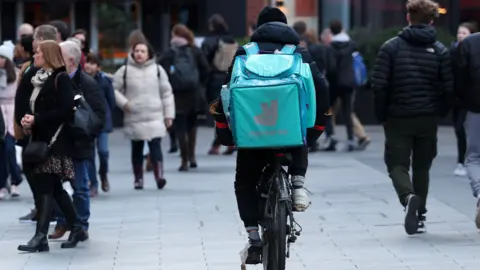In a recent update from the Home Office regarding measures to combat illegal work and safeguarding the integrity of the labor market, it has been revealed that data pertaining to hotels accommodating asylum seekers will be shared with food delivery companies. The purpose of this initiative is to enhance scrutiny over the activities of these companies, notably focusing on identifying potential illegal working practices. The names at the forefront of this initiative include well-known food delivery enterprises such as Deliveroo, Just Eat, and Uber Eats.
This agreement allows these companies to recognize suspicious behaviors that might suggest illegal working activities. For example, if a delivery account frequently operates in close proximity to one of the designated hotels catering to asylum seekers, it may trigger further investigation into the user’s activities. This initiative is an extension of the Home Office’s commitment to deter instances of asylum seekers, who are prohibited from working for the first twelve months while their asylum applications are processed, from covertly offering services through these platforms.
There has arisen a growing concern that some migrants residing in these hotels have been earning money using food delivery apps, contravening their legal standing in the country. Last month, delivery firms announced their intent to fortify checks related to their riders’ identities, ensuring that they possess the right to work legally in the United Kingdom. The Home Office noted that prior enforcement actions had already led to thousands being removed from these delivery platforms, and they expect the new data-sharing measures to bolster these results further.
Home Secretary Yvette Cooper elaborated on the significance of this crackdown by emphasizing the detrimental effects of illegal working, stating that it undermines legitimate businesses, takes advantage of vulnerable individuals, and contributes to organized immigration crime. By increasing data-sharing with delivery companies, the Home Office aims to tighten loopholes and enhance enforcement measures.
The announcement coincides with broader governmental initiatives aimed at curtailing illegal migration into the UK. Most recently, the government unveiled a comprehensive list targeting 25 individuals and organizations involved in facilitating illegal migration. This list includes a small boat supplier based in Asia, along with gang leaders operating in regions such as the Balkans and North Africa. Notably, these entities are accused of criminal activities ranging from procuring counterfeit passports to facilitating illicit transactions and smuggling operations utilizing small boats and lorries.
Foreign Secretary David Lammy framed this announcement as a “landmark moment,” reaffirming the government’s assertive stance against those profiting from the suffering of vulnerable individuals. He warned gangs that exploit vulnerable lives for financial gain that they are being watched and that coordinated efforts will be made globally to hold them accountable.
However, experts have expressed skepticism regarding the efficacy of these measures. Dr. Madeleine Sumption, the director of the Migration Observatory at Oxford University, noted that she would be surprised if the newly enacted sanctions would significantly alter the dynamics of small boat crossings into the UK. She suggested that the difficulties inherent in tackling such a multifaceted issue mean that targeting individual elements within the larger ecosystem of illegal migration is more likely to yield marginal results.
In summary, the Home Office’s recent actions illustrate a multifaceted approach to tackling illegal working within the food delivery industry while simultaneously addressing broader migration challenges facing the UK. Although there is a governmental push toward more robust action against illegal practices, the actual effectiveness of these measures remains to be thoroughly evaluated in the coming months. With increased scrutiny now placed on food delivery platforms, the landscape for both workers and consumers alike is set to change significantly.











